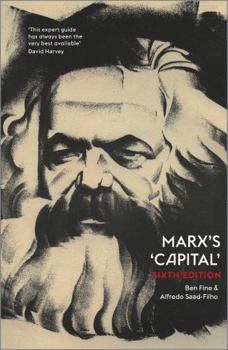Marx's 'Capital'
Select Format
Select Condition 
Book Overview
'This expert guide to the political economy of Marx's Capital has always been the very best available' - David Harvey This brilliantly concise book is the classic companion to Karl Marx's most well-known work, Capital. In print now for over a quarter of a century, and translated into many languages, this new edition has been fully revised and updated, making it an ideal modern introduction to one of the most important texts in political and economic thought today. The authors cover all central aspects of Marx's economics. They explain the structure of Marx's analysis and the meaning of the key categories in Capital, showing the internal coherence of Marx's approach, and their relevance today. Marx's method and terminology are explored in detail, with supporting examples. Short chapters set out the significance of Marx's main concepts and can be grasped easily, making it a practical text for anyone with an interest in understanding Marx's magnum opus. Discussing Capital's relevance today, the authors keep abstract theorising to a minimum. This readable introduction highlights the continuing relevance of Marx's ideas in the light of the problems of contemporary capitalism.
Format:Paperback
Language:English
ISBN:0745336973
ISBN13:9780745336978
Release Date:September 2016
Publisher:Pluto Press (UK)
Length:192 Pages
Weight:0.55 lbs.
Dimensions:0.7" x 5.4" x 8.3"
Customer Reviews
1 rating
Good intro to social & historical influences on economics
Published by Thriftbooks.com User , 19 years ago
The earliest political economists, including Smith, Ricardo and Marx, viewed economics quite differently than popular opinion sees it today. For one thing, they believed social & political institutions had profound impacts on markets. Their debate was over HOW, not if, social class, political institutions, religious and cultural institutions would effect economic growth and national development. Today, neoclassical economics refers to a general approach (a "metatheory") to economics based on supply and demand. It rests on the assumption that individuals operate rationally: i.e. each person seeks to maximize his/her individual utility or profit by making choices based on only available information given by prices. More importantly, this is the only factor that matters. Altruism does not exist, making decisions based on social customs or religious beliefs do not fit (these are not economically `rationale'), and being a farmer versus a bank CEO gives no advantage to a person. Ben Fine terms this "ahistorical and asocial" economics. That is to say, the same economic principles work in every society, in every culture, and at every stage in a society's development with absolutely no need to take into account historical, political or social factors. Marx starts off differently, with economics firmly rooted on a broader study of how society works, including social classes, historical trends and cultural values. For example, Marx used a value-led theory of production where the form of production determined the value of output, in his case, the labour put into making an item. The labour theory of value equates the "value" of an exchangeable good or service {i.e., a commodity} with the total amount of labour required to produce all the components that went in to its production. This is opposed to the neoclassical theory that everything is reducible to maximising personal pleasure (called utility). Demand is `derived' only (and this is the critical point) from an Individual's single-minded desire to wring out the most utility from a given budget. Supply is determined solely by the production costs. The price comes from the point where the supply and demand lines intersect; i.e. price is based only on the value given to a good's exchange in the market. The idea of value coming from any other cause simply has no place in neoclassical economic models. Interestingly, while neoclassic models dominate MBA programs, they are promptly thrown out the window in marketing classes, where brand loyalty, brand positioning and all sorts of irrational factors have been proven to be of fundamental importance to demand. Much is made of Marx's atheistic slant, but this ignores the real issue. Marx thought religion and religious institutions have a great deal of impact on a person's demand for a given item, as did one's social ties and the political institutions of a nation. It is neoclassical, free-market capitalism that completely dismisses the relevance of God or a





